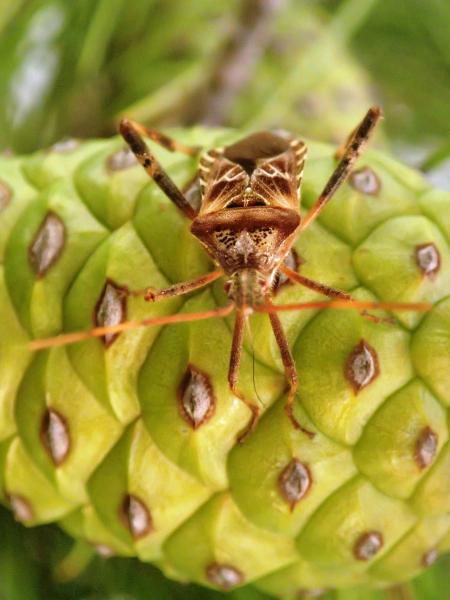
Objective:
There is still a substantial lack of knowledge about the effective impact and the ecology of the seed bug, Leptoglosus occidentalis, on the Mediterranean stone pine. Thus, the overall objective was to characterize the impact and study the ecology of this invasive insect in stone pine by (1) characterizing its damage on seeds with shell; (2) testing its preference between stone pine and other Mediterranean pines; (3) evaluating damage in Stone pine seed orchards under different management strategies and (4) inferring invasion routes of this insect in the Iberian Peninsula using genetic and field data.
Context:
The western conifer seed bug, Leptoglossus occidentalis, a bug native from West North America, arrived in Europe 20 years ago. For two decades, it has expanded rapidly, and it is now distributed in the entire European continent but also in Asia and South America. The bug feeds on seeds of several conifers by inserting a thin stylet between cone scales and sucking the kernel from inside the seed shell. For the Mediterranean Basin countries, it is feeding on the high economic value seed of Pinus pinea which poses major concerns. For the last five years, the Forest Research Centre of the School of Agriculture (Lisbon, Portugal) has been studying this bug ecology and its impact on the Mediterranean forests.
Contacts:
Ana Farinha, farinha.ana@gmail.com
Manuela Branco, mrbranco@isa.ulisboa.pt
Edmundo Sousa, edmundo.sousa@iniav.pt
Further information:
Farinha, A.O. (2019) Impact and ecological adaptation of Leptoglossus occidentalis (Hemiptera, Coreidae) in Pinus pinea. Doctoral dissertation. Lisboa: ISA, 167 p. http://hdl.handle.net/10400.5/18324
Project +PINHÃO: http://www.unac.pt/index.php/id-i/grupos-operacionais-accao-1-1-pdr2020/pinhao